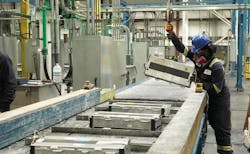Elemental Strategic Metals and Ascend Elements form EV battery recycling JV in Poland
Poland’s Elemental Strategic Metals and Ascend Elements of Westborough, Massachusetts, have formed a joint venture, AE Elemental, which will own and operate an advanced Li-ion EV battery recycling facility in Zawiercie, Poland, with another planned in central Germany.
The facility will disassemble, discharge and shred EV batteries to produce black mass, which can be used to make new engineered EV battery materials, including cathode active material (CAM) and cathode precursor (pCAM). The facility is predicted to recycle up to 12,000 metric tons of batteries per year, or approximately 28,000 EV batteries annually.
The partners jointly invested in focusing on large-scale lithium extraction from black mass. Capacity of lithium extraction capabilities processing up to 20 000 metric tons of black mass per year is expected, with the plant owners starting construction this fall and commencing operations in 2026.
The AE Elemental facility in Germany will have the capacity to recycle up to 25,000 metric tons of batteries per year, or approximately 58,000 EVs annually. Recycled materials will likely prove crucial to the EV battery supply chain as demand for critical elements rises and shortfalls result.
“Expanding into Europe will allow us to better service our customers locally and help the industry comply with new EU rules requiring recycled material in new batteries,” said Mike O’Kronley, CEO of Ascend Elements.
In late 2023, Ascend Elements announced it was partnering with SK ecoplant and its e-waste recycling subsidiary, TES, to build a $65 million battery recycling facility in Kentucky. That planned 100,000-sq ft facility, once operational, could break down up to 65,000 EV batteries and produce 12,000 metric tons of black mass annually, according to the report.
Ascend will own 25% of the Kentucky plant, while SK and TES would own the remaining stake.
About the Author
Rod Walton, EnergyTech Managing Editor
Managing Editor
For EnergyTech editorial inquiries, please contact Managing Editor Rod Walton at [email protected].
Rod Walton has spent 17 years covering the energy industry as a newspaper and trade journalist. He formerly was energy writer and business editor at the Tulsa World. Later, he spent six years covering the electricity power sector for Pennwell and Clarion Events. He joined Endeavor and EnergyTech in November 2021.
Walton earned his Bachelors degree in journalism from the University of Oklahoma. His career stops include the Moore American, Bartlesville Examiner-Enterprise, Wagoner Tribune and Tulsa World.
EnergyTech is focused on the mission critical and large-scale energy users and their sustainability and resiliency goals. These include the commercial and industrial sectors, as well as the military, universities, data centers and microgrids. The C&I sectors together account for close to 30 percent of greenhouse gas emissions in the U.S.
He was named Managing Editor for Microgrid Knowledge and EnergyTech starting July 1, 2023
Many large-scale energy users such as Fortune 500 companies, and mission-critical users such as military bases, universities, healthcare facilities, public safety and data centers, shifting their energy priorities to reach net-zero carbon goals within the coming decades. These include plans for renewable energy power purchase agreements, but also on-site resiliency projects such as microgrids, combined heat and power, rooftop solar, energy storage, digitalization and building efficiency upgrades.

